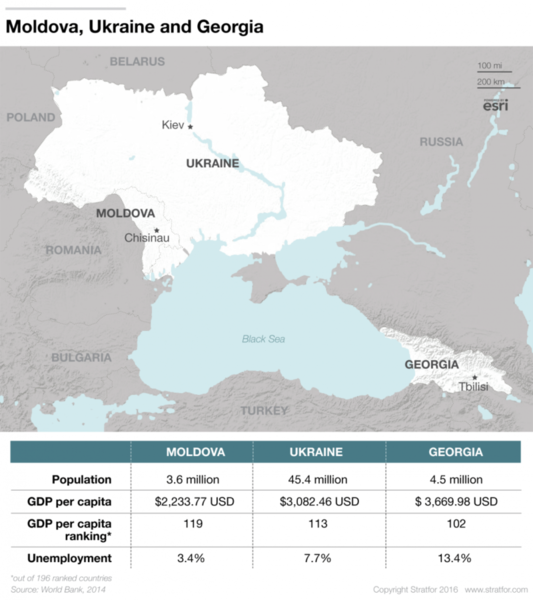Summary
As difficult to accept as the United Kingdom's recent vote to leave the European Union is for many people around the world, for some citizens of Moldova, Georgia and Ukraine, it is just baffling. For several years, their countries have aspired to join the Continental bloc, though none has clinched an official offer of membership yet. Though the Brexit will not precipitate the European Union's demise in the immediate term, it will undoubtedly fix the union's attention on its inherent problems. Consequently, Moldova, Ukraine and Georgia worry that EU interest in expanding east will decrease, enabling Russia's influence in the region to grow.
Analysis
For Ukraine, Georgia and Moldova, the stakes of a Brexit are high. Already, politicians from all three countries are expressing concerns that the move will distract the European Union from the problems in Ukraine and Georgia — and from Russia's military presence there. In the wake of the referendum, the Ukrainian and Georgian presidents traveled to various cities in Europe, including Berlin, to meet with German Chancellor Angela Merkel and other EU officials. The meetings were planned even before the Brexit vote, but they offered the leaders an opportunity to discuss what the general uncertainty in the Continental bloc will mean for their aspirations to join it. EU officials stressed that the immediate repercussions of the referendum will be limited for the three countries. Nonetheless, since negotiations on the United Kingdom's exit will take at least two years, the political situation in the European Union will be unstable for the foreseeable future. Now, the countries are preparing for a worst-case scenario in which visa liberalization, an important landmark in obtaining EU membership, is postponed even further, making accession as distant a promise as it ever was.
The Stakes
Visa liberalization is not the only issue hanging in the balance for Ukraine. Even before the Brexit, the European Union had shown some signs of give on the possibility of easing sanctions against Russia. The disarray following the British referendum will make the bloc more likely to reduce its restrictions, which were implemented in response to Russia's involvement in separatist uprisings in Crimea and eastern Ukraine. Having resolved in early July to extend sanctions through the end of the year, EU members are becoming increasingly divided on the issue. With another EU parliamentary debate on the sanctions set for October, Brussels could reduce or even lift the measures beginning in 2017.

Georgia, meanwhile, faces important parliamentary elections in October, and its government fears that the Brexit will sway the population's pro-Europe stance. Russia-allied parties are gaining ground in Georgia, and they are using the discord in the European Union as evidence that the country should align itself with Moscow instead of with Brussels. Moreover, in June, the European Union opted to delay granting Georgia the full visa liberalization it had promised. During a recent trip to Tbilisi, German Foreign Minister Frank-Walter Steinmeier tried to assuage the Georgian government's fears that the decision bodes ill for the country's admittance to the European Union. Even so, many politicians in Georgia are skeptical of the Continental bloc's intentions.
In Moldova, a similar pattern is playing out. Prime Minister Pavel Filip has said the country will continue on its path toward EU integration despite the results of the British referendum. But opposition politicians such as Igor Dodon, the leading presidential candidate and head of the pro-Russia Party of Socialists, are using the Brexit to claim that the European Union is falling apart and that, as a result, Moldovashould stop its efforts to gain membership.
Military Concerns
The divisions in the European Union and the possibility for eased sanctions have also raised concerns among the three countries — especially Ukraine — that the West will not respond to a Russian military presence in their territories. In its past military interventions in these countries, Russia curbed its aggression to maintain good ties with the European Union. But without considerable diplomatic pressure from the West, Russia may be less restrained in its military activities in Georgia, Moldova and Ukraine.
Overall, the three countries are unlikely to waver in their efforts to join the European Union. But the fallout from the Brexit will raise doubts about the future of the bloc and increase opposition to EU membership within each country. At the same time, forces sympathetic to Russia will continue to gain traction in Moldova, Georgia and, to a lesser extent, Ukraine. Yet, as the next vote on Russian sanctions draws closer and as dissent continues to grow among EU states, the hopes of Georgia, Moldova and Ukraine to join the European bloc will not come to fruition.




